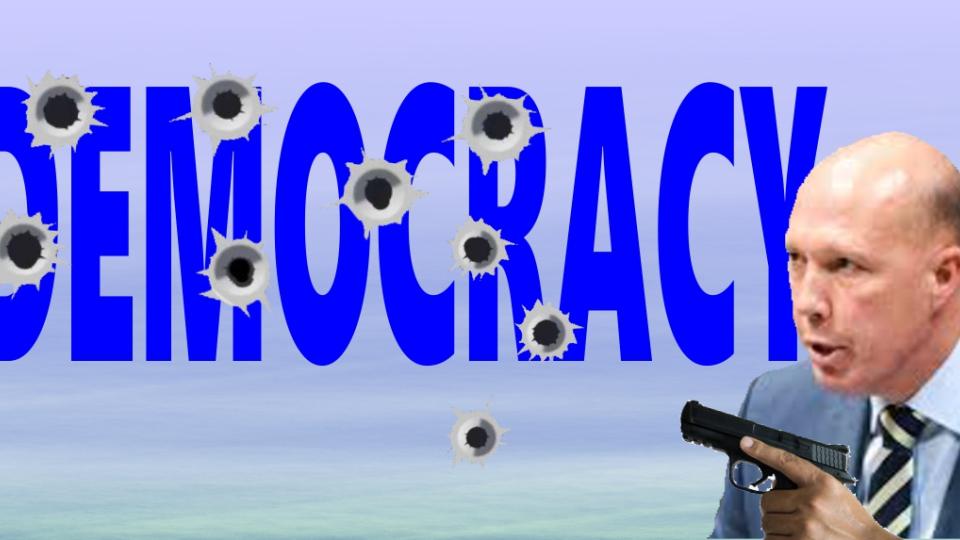Dutton’s war on democracy

With the re-election of the Coalition government, conservatives have become emboldened to intensify their agenda of transferring even more wealth and power to the already dominant at the expense of the rest of us.
One sign of this is the rise in prominence of one the most hard-right figures in the Coalition: home affairs minister Peter Dutton.
Dutton has been at the centre of the Coalition government’s efforts to whip up racist scapegoating and strengthen the state’s repressive powers, a task for which he was well-prepared by his time in the Queensland police.
In 2014, he was appointed immigration minister by then-prime minister Tony Abbott and took Australia’s persecution of asylum seekers to a new low. Dutton seems to take particular relish in denying medical care to extremely vulnerable people and luridly demonising refugees. He has described refugees as child abusers willing to falsely claim rape and access abortion services to enter Australia.
The Malcolm Turnbull government created the Department of Home Affairs in 2017 to bring together national security, border control and federal law enforcement. This move, like the creation of the US Department of Homeland Security it was based on, was designed to invent or exaggerate threats and justify a bolstered security apparatus.
Dutton, with his pose as a tough-talking former cop and record of securing borders against the non-existent threat posed by asylum seekers, was the obvious choice as minister.
He quickly moved to increase Australian Federal Police powers to search and detain people at airports and make it easier to exclude people from Australia on counter-terrorism grounds.
Last December, Dutton’s Assistance and Access Bill was passed, greatly expanding police powers to bypass computer encryption and seize data by warrant. These powers were used in the recent raids on the ABC and News Corp journalist Annika Smethurst.
The raid on Smethurst was related to another of Dutton’s anti-democratic projects. She had exposed discussions between the home affairs and defence departments about allowing the Australian Signals Directorate to spy on Australian citizens and act as the state’s spooks abroad.
Dutton is also keen on new powers for police and security agencies to use facial recognition and biometric data, although the relevant legislation appears to be shelved for now.
Governments, whose job it is to regulate capitalism in the interests of a powerful few, often seek new powers to monitor and control dissent.
In a situation of formal democracy under which important rights have been won by past struggles of working people and the oppressed, pro-capitalist governments cannot necessarily impose repression at will. But they will try to get away with what they can — particularly if opposing forces allow them to.
Labor has opposed some of the more egregiously thuggish activities of Dutton and his security forces, such as the AFP raids.
But recently-appointed shadow home affairs minister Kristina Keneally is keen to promote her national security priorities and emphasise that there is “no difference between Labor and the government when it comes to our border protection regime”.
Labor fully accepts the ludicrous “national security” panic about the “threat” posed by desperate refugees and the enhancement of the national security state with which they are being victimised.
The Greens have been more forthright in opposing increased security state powers.
Last month, Greens justice spokesperson Nick McKim rightly said: “For two decades the major parties have endorsed wave after wave of increased surveillance powers for security agencies which have undermined Australians' privacy and civil liberties.” He called for the creation of a Charter of Rights.
While parliamentary opposition to government attempts at repression and calls for better legal protection are welcome, these are limited without a broader understanding of and approach to democratic rights.
Under capitalism, repressive state power is aimed at preventing and disrupting opposition to the rule of the rich and powerful. Mobilised popular opposition has chipped away some of this power and won certain rights to assemble, organise and communicate relatively freely.
Such mobilised popular power is needed to continue to defend our rights.
The defence of democratic rights is intimately connected to the interests of the great majority. We need to prevent new spying powers being used against emerging union struggles or climate activists determined to disrupt business-as-usual.
Socialists are at the forefront of campaigns to oppose new government repression and defend democratic rights, as part of a broader project of building popular power.
The illusion of liberty under capitalism is being increasingly exposed as subjugation at work protected by a repressive state. We need to reject repression and fight for the participatory democracy, solidarity and equality of socialism.